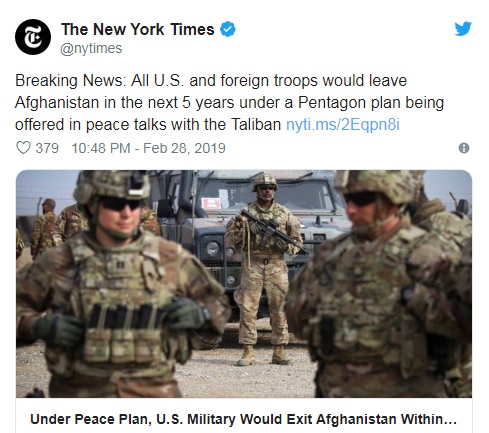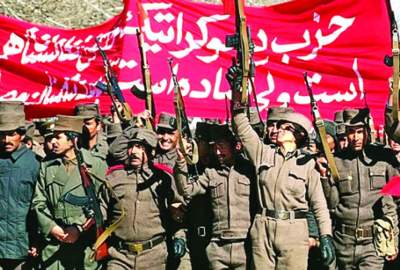All American troops would withdraw from Afghanistan over the next three to five years under a new Pentagon plan being offered in peace negotiations that could lead to a government in Kabul that shares power with the Taliban.
Publish dateSaturday 2 March 2019 - 10:59
Story Code : 180579
The rest of the international force in Afghanistan would leave at the same time, after having mixed success in stabilizing the country since 2001. The plan is being discussed with European allies and was devised, in part, to appeal to President Trump, who has long expressed skepticism of enduring American roles in wars overseas.
The plan calls for cutting by half, in coming months, the 14,000 American troops currently in Afghanistan. It would task the 8,600 European and other international troops with training the Afghan military — a focus of the NATO mission for more than a decade — and largely shift American operations to counterterrorism strikes.
Various elements of the plan were shared with The New York Times by more than a half-dozen current and former American and European officials. It intends to help talks with the Taliban that are being led by Zalmay Khalilzad, the American special envoy.
So far, the plan has been met with broad acceptance in Washington and NATO headquarters in Brussels. But American officials warned that Mr. Trump could upend the new plan at any time.
And officials said that even if the peace talks broke down, the United States would go forward with shifting to counterterrorism missions from training Afghan forces.
Until the final withdrawal, several thousand American forces would continue strikes against Al Qaeda and the Islamic State, including on partnered raids with Afghan commandos. The counterterrorism missions, and the military’s dwindling presence, are also critical to allowing the C.I.A. to operate in Afghanistan.
Lt. Col. Koné Faulkner, a Pentagon spokesman, said no decisions had been made as peace talks continued. The Defense Department “is considering all options of force numbers and disposition,” Colonel Faulkner said.
Taliban officials in Moscow this month. Taliban negotiators oppose the proposal for American counterterrorism troops to remain in Afghanistan for up to five years.
Credit
Pavel Golovkin/Associated Press
“The Europeans are perfectly capable of conducting the training mission,” James Stavridis, a retired American admiral and former top NATO commander who is now with the Carlyle Group private equity firm. “It is a smart division of labor to have the United States shift the bulk of its effort toward the special forces mission and having the Europeans do the training mission.”
Mr. Stavridis said the two missions would be coordinated, including American logistical support and military backup for the European troops.
On Monday, American diplomats met with the Taliban in Qatar in the highest-level negotiations yet, including the attendance of Gen. Austin S. Miller, the commander of the international mission in Afghanistan. The negotiations paused on Wednesday and are set to resume on Saturday.
The two sides have sought to flesh out a framework agreement, decided in principle last month, for the full withdrawal of foreign troops and assurances by the Taliban to prevent terrorist groups that seek to attack the United States from using Afghan territory as a safe haven.
The Afghan government has not been a part of the negotiations because of Taliban reluctance to talk to President Ashraf Ghani or his envoys.
The prospect of an American military withdrawal has raised fears across the world that it could lead to the fall of the Western-backed government in Kabul and a return to the extremist rule of the Taliban. Before it was ousted in 2001, the Taliban was accused of human rights abuses, prohibited girls from attending school and imposed harsh penalties on accused heretics.
American officials have said any deal to withdraw international forces from Afghanistan must involve a cease-fire agreement and the inclusion of government leaders in the negotiations.
The plan calls for cutting by half, in coming months, the 14,000 American troops currently in Afghanistan. It would task the 8,600 European and other international troops with training the Afghan military — a focus of the NATO mission for more than a decade — and largely shift American operations to counterterrorism strikes.
Various elements of the plan were shared with The New York Times by more than a half-dozen current and former American and European officials. It intends to help talks with the Taliban that are being led by Zalmay Khalilzad, the American special envoy.
So far, the plan has been met with broad acceptance in Washington and NATO headquarters in Brussels. But American officials warned that Mr. Trump could upend the new plan at any time.
And officials said that even if the peace talks broke down, the United States would go forward with shifting to counterterrorism missions from training Afghan forces.
Until the final withdrawal, several thousand American forces would continue strikes against Al Qaeda and the Islamic State, including on partnered raids with Afghan commandos. The counterterrorism missions, and the military’s dwindling presence, are also critical to allowing the C.I.A. to operate in Afghanistan.
Lt. Col. Koné Faulkner, a Pentagon spokesman, said no decisions had been made as peace talks continued. The Defense Department “is considering all options of force numbers and disposition,” Colonel Faulkner said.
Taliban officials in Moscow this month. Taliban negotiators oppose the proposal for American counterterrorism troops to remain in Afghanistan for up to five years.
Credit
Pavel Golovkin/Associated Press
“The Europeans are perfectly capable of conducting the training mission,” James Stavridis, a retired American admiral and former top NATO commander who is now with the Carlyle Group private equity firm. “It is a smart division of labor to have the United States shift the bulk of its effort toward the special forces mission and having the Europeans do the training mission.”
Mr. Stavridis said the two missions would be coordinated, including American logistical support and military backup for the European troops.
On Monday, American diplomats met with the Taliban in Qatar in the highest-level negotiations yet, including the attendance of Gen. Austin S. Miller, the commander of the international mission in Afghanistan. The negotiations paused on Wednesday and are set to resume on Saturday.
The two sides have sought to flesh out a framework agreement, decided in principle last month, for the full withdrawal of foreign troops and assurances by the Taliban to prevent terrorist groups that seek to attack the United States from using Afghan territory as a safe haven.
The Afghan government has not been a part of the negotiations because of Taliban reluctance to talk to President Ashraf Ghani or his envoys.
The prospect of an American military withdrawal has raised fears across the world that it could lead to the fall of the Western-backed government in Kabul and a return to the extremist rule of the Taliban. Before it was ousted in 2001, the Taliban was accused of human rights abuses, prohibited girls from attending school and imposed harsh penalties on accused heretics.
American officials have said any deal to withdraw international forces from Afghanistan must involve a cease-fire agreement and the inclusion of government leaders in the negotiations.
avapress.com/vdcjayevhuqeoiz.92fu.html
Top hits







